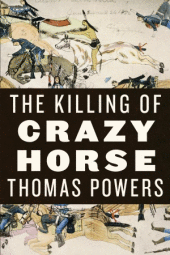 Each day leading up to the March 10 announcement of the 2010 NBCC award winners, Critical Mass highlights one of the thirty-one finalists (to read other entries in the series, click here). Today, NBCC board member Elizabeth Taylor discusses biography finalist Thomas Powers's The Killing of Crazy Horse (Knopf).
Each day leading up to the March 10 announcement of the 2010 NBCC award winners, Critical Mass highlights one of the thirty-one finalists (to read other entries in the series, click here). Today, NBCC board member Elizabeth Taylor discusses biography finalist Thomas Powers's The Killing of Crazy Horse (Knopf).
As a little boy, Crazy Horse wanted to be talked about, be famous. He went on to lead the Oglala Lakota Sioux, and become a character of mythic proportions famous for his declaration: “A good day to fight, a good day to die.”
Crazy Horse did die and the question of his death animates Thomas Powers’s dramatic book. The death of Crazy Horse was a traumatic event in American history, and Powers has focused his considerable talents on the vast subject.
The book is a dazzling feat of scholarship. Powers is attentive to the urgency of this story and the richness of the history. As Powers writes, he speaks to the reader. He acknowledges conflicting evidence and pieces together the past.
Powers grew up in a generation of children who played Cowboys and Indians, and in reading this biography it’s clear that he preferred playing an Indian.
The panoramic cast of characters in The Killing of Crazy Horse enhances our understanding of Crazy Horse and the nineteenth-century American West. There’s General Custer, of course, defeated by Crazy Horse at the Battle of Little Big Horn. But there are others like No Water, who scheme against Crazy Horse. Then there was the ultimate betrayer, Little Big Man, and the rivals Red Cloud and Spotted Tail.
When Powers vividly recreates the scene in which Crazy Horse died in federal custody, we can feel the tension outside the guardhouse door, and hear the chants “Kill him! Kill him!”
Although no photograph of Crazy Horse exists today, Thomas Powers has fully rendered one of the most important characters in nineteenth-century history.
To read an excerpt from The Killing of Crazy Horse, click here. Thomas Powers's author page at Knopf can be accessed here.


